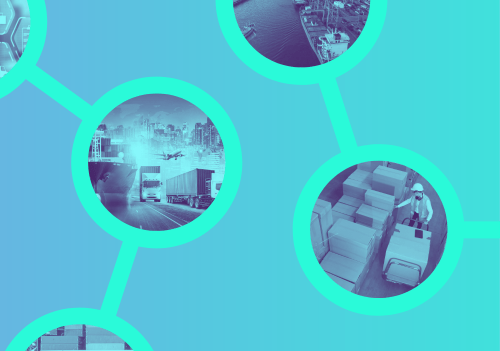The logistics industry plays a vital role in global trade and commerce, serving as the backbone of supply chains across various sectors. It encompasses a wide range of activities, including transportation, warehousing, inventory management, packaging, and distribution, all aimed at efficiently moving goods from production to consumption. To stay competitive in this dynamic landscape, logistics companies have embraced innovation, optimized operational efficiency, and adapted to emerging market dynamics while keeping sustainability at the forefront of their strategies. CCIS graduate and Head of Business Development at RiskPoint, Juan Ramallo, has delved into the questions these innovations have raised about cybersecurity in logistics businesses.
How the Logistics Industry Works
The logistics industry is made up of 6 key components.
- Transportation: This segment involves the movement of goods via various modes such as road, rail, air, and sea.
- Warehousing and Distribution: Warehouses serve as intermediate storage facilities where goods are sorted, stored, and prepared for distribution.
- Inventory Management: Effective inventory management is essential for balancing supply and demand, minimizing stockouts, and avoiding excess inventory.
- Supply Chain Visibility: Achieving end-to-end visibility in the supply chain is critical for monitoring the movement of goods, identifying potential bottlenecks, and proactively addressing issues to ensure smooth operations.
- Last-Mile Delivery: The final stage of the logistics process involves delivering goods to the end customer. Last-mile delivery poses unique challenges due to factors such as urban congestion, customer preferences for faster delivery, and the need for flexible delivery options.
- Sustainability: With growing environmental concerns, sustainability has emerged as a key focus area for the logistics industry. Companies are increasingly adopting eco-friendly practices such as electric vehicles, alternative fuels, route optimization, and packaging redesign to reduce carbon emissions and minimize their environmental footprint.
Key Concerns for Cybersecurity in Logistics Businesses
The logistics industry faces a myriad of threats and risks that can disrupt operations, impact profitability, and compromise customer satisfaction. As the industry becomes increasingly digitized, logistics companies are vulnerable to cyberattacks such as data breaches, ransomware, and phishing scams. A breach in cybersecurity can lead to the loss of sensitive information, financial losses, operational disruptions, and damage to customer trust. These cyberattacks lend a hand to supply chain disruption which can result in inventory shortages, increased costs, and damage to the reputation of logistics companies.
Additionally, the logistics industry is subject to a complex web of regulations and compliance requirements, both domestically and internationally. Failure to comply with regulations related to safety, environmental protection, customs, and trade can result in fines, penalties, legal liabilities, and reputational damage.
Lastly, political instability, trade tensions, and changes in government policies can create uncertainty in global markets and disrupt international trade flows. Geopolitical events such as trade wars, sanctions, and geopolitical conflicts can lead to supply chain disruptions, trade barriers, and increased costs for logistics companies operating in affected regions.
Internal Cyber Threats
Employees or contractors with access to sensitive information or systems may intentionally or unintentionally misuse their privileges to steal data, sabotage operations, or compromise security controls. Insider threats can arise due to disgruntled employees, negligent behavior, or inadequate security training. Additionally, weak or improperly configured access controls may allow unauthorized individuals to gain access to critical systems, networks, or data. Insider abuse of privileged accounts or unauthorized sharing of credentials can lead to data breaches, system compromise, and unauthorized modifications to sensitive information.
Third-Party Cyber Risks
Logistics companies often rely on a network of suppliers, vendors, subcontractors, and third-party service providers to support their operations. However, these third parties may introduce cybersecurity risks, such as vulnerabilities in their systems, inadequate security practices, or data breaches. The outsourcing of certain business functions, such as IT services, software development, or customer support exposes logistics companies to cybersecurity risks associated with the security posture of these vendors. A breach or compromise in a third-party service provider’s systems can have cascading effects on the organization’s cybersecurity posture and operations.
In conclusion, cybersecurity is of paramount importance in the logistics industry, given the significant internal threats and risks posed by third parties. Logistics companies must prioritize vendor risk management, due diligence, and contractual agreements to mitigate the cybersecurity risks inherent in collaborating with external parties and ensure the security of their data and operations.









